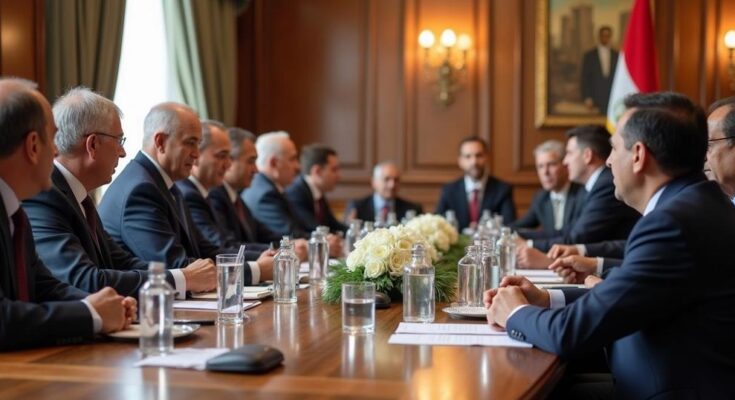Egypt is forming a new security alliance with Somalia and Eritrea to address rising tensions with Ethiopia. This trilateral partnership aims to bolster regional stability, with Eritrea training Somali forces and Egypt providing military support. The move follows Ethiopia’s controversial agreements with Somaliland and underscores the ongoing struggles for territorial integrity in the Horn of Africa.
Egypt is strategically cultivating a new security partnership with Somalia and Eritrea, which may escalate existing tensions in the Horn of Africa. On Thursday, Egyptian President Abdel Fattah al-Sisi arrived in Asmara, Eritrea, following a meeting with Somali President Hassan Sheikh Mohamud, who had visited Eritrea a day prior. The leaders are expected to engage in trilateral discussions, with focus areas including the enhancement of bilateral relations and regional stability in the Horn of Africa and Red Sea, as indicated by a statement from the Egyptian Presidency. Earlier discussions between Presidents Mohamud and Afwerki covered various regional and international issues, including the importance of mutual territorial protection, particularly against Ethiopia. As reported, “The two leaders underscored the imperative of further bolstering the bilateral cooperation of the two sisterly countries in the heavy tasks of the maintenance of the sovereignty, territorial integrity, independence, and unity of Somalia,” according to the Eritrean Ministry of Information. Eritrea has been involved in training Somali National Army troops for the past three years. However, Egypt’s involvement has heightened regional sensitivities, given its recent defense cooperation agreement with Somalia. This deal includes the training of Somali forces and potential troop deployment to support a new African Union mission, set to replace the existing African Union Transitional Mission in Somalia (Atmis) by the end of December. Somalia’s effort to exclude Ethiopia from future security arrangements stems from allegations that Ethiopia is attempting to undermine Somali sovereignty. Tensions flared earlier this year when Ethiopia signed a contentious memorandum with Somaliland, which may allow access to a naval base in exchange for recognizing Somaliland’s independence. Consequently, Somalia has consistently protested against Ethiopia at international forums, accusing it of violating its territorial integrity. The dynamics of this emerging coalition among Egypt, Somalia, and Eritrea could mean varied implications for each party involved. Somalia may perceive enhanced security against Ethiopia, now considered an adversary. Egypt views this as a method to secure its interests in the Red Sea and isolate Ethiopia, particularly in light of the controversial Grand Ethiopian Renaissance Dam project on the Nile. Meanwhile, for Eritrea, this alliance could serve as a politically motivated strategy against Ethiopia, with whom it shares a fraught history following the Tigray conflict and subsequent ceasefire. Amid these developments, Turkey has previously attempted to mediate discussions between Somalia and Ethiopia concerning the Somaliland agreement, but the new alliance could diminish the prospects of continued dialogue. Furthermore, prior to the trip to Asmara, Egyptian Foreign Minister Badr Abdelatty discussed Egypt’s strategic stance on regional issues with African ambassadors, emphasizing their significance for continental security. Egypt’s reliance on the Suez Canal for economic revenue and its concerns regarding Ethiopian naval ambitions off the coast of Somaliland illustrate the complexities of maritime security in the region. Historically, Ethiopia, Somalia, and Eritrea had endeavored to create a cooperative Horn of Africa alliance; however, this new coalition effectively excludes Addis Ababa from the negotiations.
The Horn of Africa has long been a region marked by complex geopolitical relationships, particularly involving Egypt, Somalia, and Ethiopia. The recent political maneuvers arise amidst heightened tensions over territorial integrity and influence in the region. The situation is further complicated by Ethiopia’s controversial military engagements and infrastructure projects, such as the Grand Ethiopian Renaissance Dam, which has drawn the ire of Egypt, a nation that relies heavily on the Nile River. Meanwhile, Somali-Ethiopian relations have soured due to accusations of territorial encroachments and military interference, leading Somalia to seek stronger alliances with Eritrea and Egypt for regional security. Understanding these underlying tensions is crucial to grasping the significance of the emerging alliance among these three nations.
In conclusion, Egypt’s initiative to forge a new alliance with Somalia and Eritrea represents a critical inflection point in the Horn of Africa’s geopolitical landscape. The alliance signals potential shifts in security dynamics, with each nation seeking to address perceived threats, particularly from Ethiopia. The ramifications of this coalition could destabilize the already tenuous relations in the region, further complicating efforts for unity and cooperation among Horn of Africa nations. The developments warrant close observation as they could influence future regional stability and security policies.
Original Source: nation.africa




